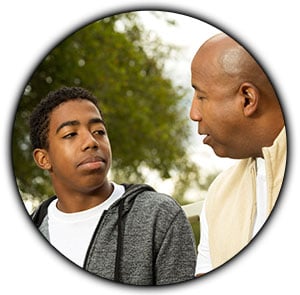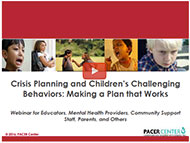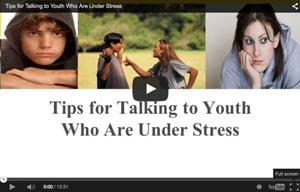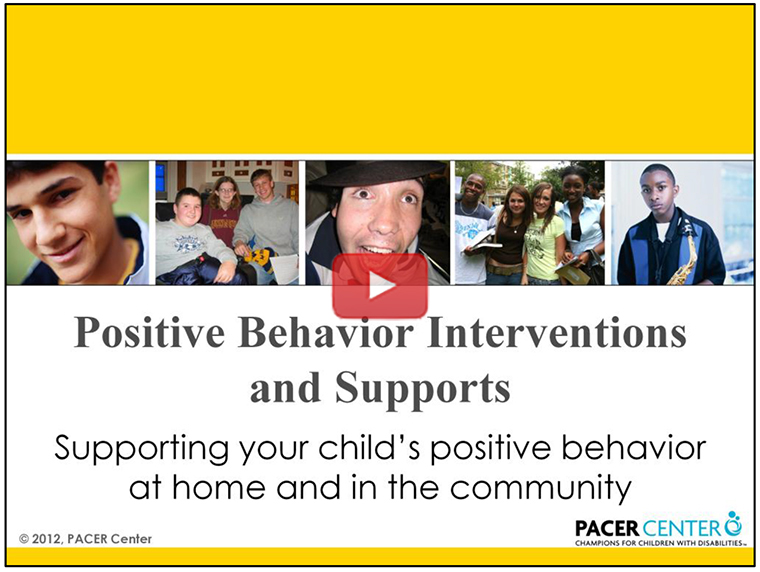Featured Resources
Videos
Crisis Planning and Children’s Challenging Behaviors: Making a Plan That Works
This archived webinar is for educators, mental health providers, community support staff and other professionals who would like more information on crisis planning. It covers some key features of proactive crisis plans, what we should know about challenging behaviors before developing a crisis plan, and questions to ask when considering a child’s escalating challenging behaviors. This webinar covers principles of wellness, recovery, and self-advocacy when working with children and youth who have behavioral health needs and require proactive crisis planning.
Tips for Talking to Youth Who Are Under Stress
This presentation is for first responders, police, youth workers and others who work with youth with disabilities to help prevent the escalation of challenging behaviors.
Positive Behavior Interventions and Supports:
Supporting your child's positive behavior at home and in the community
Parents are their child’s first teacher and are crucial in helping them be successful in school, at home and in the community. PBIS is a research-based system of positive discipline based on prevention and the belief that appropriate behaviors can be taught.
Minnesota School-Wide Positive Behavior Interventions and Supports (SW-PBIS)
The Power of the Adolescent Brain: 6 video segments (TAG Talks)
These videos, sponsored by the federal Office of Adolescent Health, Department of Health and Human Services (HHS), review adolescent brain development and how it affects learning, health, and behavior and include tips for parents.
More Videos:
- Full Presentation (all segments)
- Segment 1: The Power of the Adolescent Brain
- Segment 2: Adolescents, Risk, and Behavior
- Segment 3: The Adolescent Brain and Addiction
- Segment 4: Adolescents and Mental Health
- Segment 5: The Adolescent Brain: What Adults Need to Know and Do
- Segment 6: Questions and Answers
Multicultural Videos
Supporting Your Child with Challenging Behaviors
School can be a difficult place for children and youth with challenging behaviors to be successful. Academic, behavioral and social expectations can overwhelm students with mental health, emotional or behavioral needs and increase unwanted behaviors. This video is a short introduction on how parents can positively support their child with challenging behaviors at home and at school.
How Do I Know If My Child Has ADHD
PACER Multicultural Advocate Hassan Samantar presents "How Do I Know If My Child Has ADHD" in the Somali language.
Materials & Resources

- "Considering a Private Residential Treatment Program for a Troubled Teen? Questions for Parents and Guardians to Ask"
This is a consumer guide developed by the Federal Trade Commission to assist parents in choosing a safe residential treatment program for their children. It was written after the "Stop Child Abuse in Residential Programs for Teens Act of 2008" (H.R. 6358) was passed to establish minimum standards for prevention of child abuse and neglect at teen residential programs.
- Effective Strategies Checklist: Children and Youth with Developmental Disorders and Challenging Behavior
Children and youth who have intellectual or developmental disabilities are at elevated risk for co-occurring psychiatric or behavioral disorders. This article provides some information on strategies that have resulted in successful outcomes that have decreased the risk for juvenile justice or residential placement. produced by: The National Technical Assistance Center for Children's Mental Health
- Georgetown University Center for Child and Human Development
provides information for families who have children and youth with special needs, and particularly those who are at risk or have mental health needs.
- Crisis Management Plan: Support at Home for Children and Youth with Mental Health Needs
Most of us experience a time when events happen that make us feel anxious, stressed, or needing support. For parents of children and youth with mental health needs, an experience that produces distress may quickly escalate into a crisis if we do not know how to help reduce the intensity of the situation. Parents may also feel embarrassment when caught in a situation they can’t stop. Developing a written crisis management plan to use at home is one way to be proactive in attempting to handle crisis situations.
- Tips for Talking to Youth Who Are Under Stress
In a stressful or crisis situation, your youth may not be able to manage the situation. He or she may also have disabilities that increase their inability to manage their own behavior when under stress. Parents are aware that there often is not a perfect response or method that works 100 percent of the time to change or resolve unwanted behavior. There are effective strategies that may prove useful and effective in calming your son or daughter and soothing their anxiety in a stressful situation






